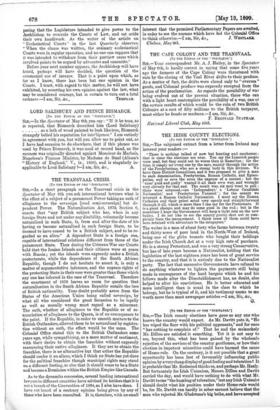THE TRANSVAAL CRISIS.
[TO THE EDITOR OF THE "SPECTATOR."] Sin,—In a short paragraph on the Transvaal crisis in the Spectator of May 6th you ask international lawyers what is the effect of a subject of a paramount Power taking an oath of allegiance to the sovereign [read semi-sovereign] but de- pendent Power. The Naturalisation Act, 1870, Section 6, enacts that "any British subject who has, when in any foreign State and not under any disability, voluntarily become naturalised in such State, is, from and after the date of his having so become naturalised in such foreign State, to be deemed to have ceased to be a British subject, and to be re- garded as an alien." A dependent State is a foreign one, capable of international relations different from those of the paramount State. Thus during the Crimean War our Courts held that the Ionian Islands and their citizens were at peace with Russia; yet the islands were expressly under a British protectorate, while the dependence of the South African Republic, though I do not hesitate to assert it, is only a matter of argumentative inference, and the express rights of the protecting State in their case were greater than those which any one has inferred in the case of the Transvaal. Therefore the enactment of 1870 leaves no room for question that naturalisation in the South African Republic entails the less of British nationality. Your doubt probably arose from the States of the American Union being called sovereign, by what all who considered the great Secession to be legally as well as morally wrong must regard as a misnomer. The oath, whether of allegiance to the Republic or of re- nunciation of allegiance to the Queen, is of no consequence to the point. If the Republic, in order to smooth matters to the pritizh Outlanders, allowed them to be naturalised by registra- tion without an oath, the effect would be the same. The Colonial Office stated this to the British Outlanders some years ago, while sympathising, as a mere matter of sentiment, with their desire to obtain the franchise without expressly renouncing their native allegiance. If they are to obtain the franchise, there is no alternative but that either the Republic should confer it on aliens, which I think no State has yet done for the political franchise though municipal rights may stand on a different footing, or else that it should cease to be a State and become a Dominion within the British Empire like Canada.
As to the dynamite concession, several leading international lawyers in different countries have advised its holders that it is not a breach of the Convention of 1884, as I also have done. I have not heard of a eontrary opinion being given by any of those who have been consulted. It is, therefore, with no small interest that the promised Parliamentary Papers are awaited, in order to see the reasons which have led the colonial Office to think otherwise.—I am, Sir, &c., J. WESTLAEE. Chelsea, May 9th.






































 Previous page
Previous page